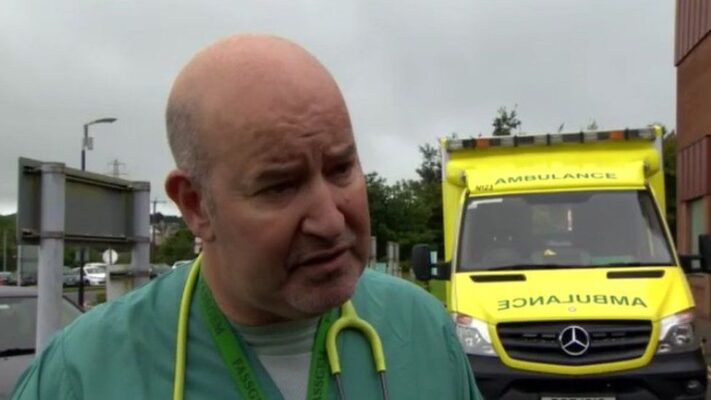
Dr Paul Baylis says the situation at Altnagelvin Hospital is the “worst” in his 30-year career
Emergency Department consultant Dr Paul Baylis said it is the “worst situation” he has seen in his 30-year career.
He said the department was experiencing staff shortages, along with the rest of the hospital.
“When we don’t have the staff to provide safe care, areas get shut down,” he told BBC Radio Foyle.
It comes as a health union warned that absences due to Covid-19 was affecting one in 10 staff across all health trusts, as the Omicron variant continues to spread with transmission rates at an “extraordinary level”.
The Department of Health (DoH) said services are currently under an “increased level of challenge” because of the Omicron variant’s “level of transmissibility and the spiralling levels of infection”.
The current wave of Covid-19 cases is “likely to impact severely both in terms of health service pressures and in terms of depleting staffing capacity further,” a DoH spokeswoman added.
“Our resources are under such pressure because it’s the winter. We get that every year, but on top of it this year we have the Omicron variant taking out large swathes of our staff [from work],” Dr Baylis said.
“I am losing 15% to 20% of my Emergency Department nursing and medical staff and it’s almost impossible to provide the safe and quality services that we [usually] provide,” the senior doctor said.
Dr Baylis described seeing staff as “tearful at the end of shifts”, adding: “We will keep delivering services as best we can but the quality of care is way, way down.
“That is perhaps the hardest thing for the doctors and nurses; knowing that the quality of care is poor but all we can do is the best with what we have got.”
Dr Baylis said there are 30 spaces in Altnagelvin’s Emergency Department and at lunchtime on Friday there were more than 40 people waiting for beds.
“Doctors and nurses are being put in a situation where we have more people coming through the doors than we have places to put them,” he said.
“That is people being told they are sick enough to come to hospital and then they’re being asked to sit in a chair and hold their drip bag,” he said.
Dr Baylis also said there are “major problems” in hospitals across Northern Ireland with discharging people who are fit to leave.
He urged family members to “go the extra mile” to help collect their relatives from hospitals.

Altnagelvin Hospital under severe pressures with staff shortages
The Department of Health spokeswoman said health trusts will continue to try to maintain high priority elective care.
“However, if unscheduled pressures intensify, services may need to scale back to redeploy resources,” she said.
Critical care and respiratory care are now being managed on a regional basis, the spokeswoman said, to maximise capacity “and help to smooth pressures, if required”.
Tags:




